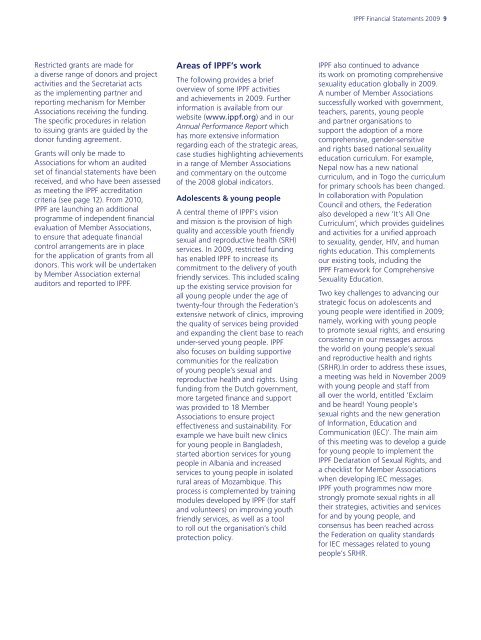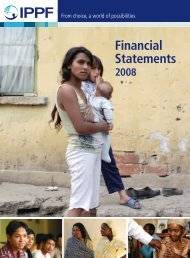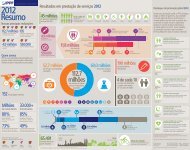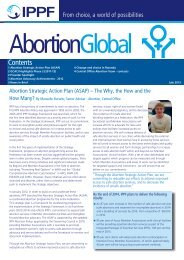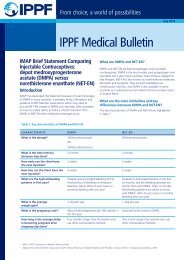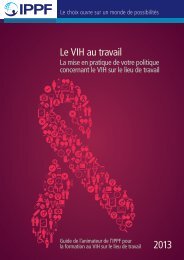Financial Statements - International Planned Parenthood Federation
Financial Statements - International Planned Parenthood Federation
Financial Statements - International Planned Parenthood Federation
Create successful ePaper yourself
Turn your PDF publications into a flip-book with our unique Google optimized e-Paper software.
IPPF <strong>Financial</strong> <strong>Statements</strong> 2009 9<br />
Restricted grants are made for<br />
a diverse range of donors and project<br />
activities and the Secretariat acts<br />
as the implementing partner and<br />
reporting mechanism for Member<br />
Associations receiving the funding.<br />
The specific procedures in relation<br />
to issuing grants are guided by the<br />
donor funding agreement.<br />
Grants will only be made to<br />
Associations for whom an audited<br />
set of financial statements have been<br />
received, and who have been assessed<br />
as meeting the IPPF accreditation<br />
criteria (see page 12). From 2010,<br />
IPPF are launching an additional<br />
programme of independent financial<br />
evaluation of Member Associations,<br />
to ensure that adequate financial<br />
control arrangements are in place<br />
for the application of grants from all<br />
donors. This work will be undertaken<br />
by Member Association external<br />
auditors and reported to IPPF.<br />
Areas of IPPF’s work<br />
The following provides a brief<br />
overview of some IPPF activities<br />
and achievements in 2009. Further<br />
information is available from our<br />
website (www.ippf.org) and in our<br />
Annual Performance Report which<br />
has more extensive information<br />
regarding each of the strategic areas,<br />
case studies highlighting achievements<br />
in a range of Member Associations<br />
and commentary on the outcome<br />
of the 2008 global indicators.<br />
Adolescents & young people<br />
A central theme of IPPF’s vision<br />
and mission is the provision of high<br />
quality and accessible youth friendly<br />
sexual and reproductive health (SRH)<br />
services. In 2009, restricted funding<br />
has enabled IPPF to increase its<br />
commitment to the delivery of youth<br />
friendly services. This included scaling<br />
up the existing service provision for<br />
all young people under the age of<br />
twenty-four through the <strong>Federation</strong>’s<br />
extensive network of clinics, improving<br />
the quality of services being provided<br />
and expanding the client base to reach<br />
under-served young people. IPPF<br />
also focuses on building supportive<br />
communities for the realization<br />
of young people’s sexual and<br />
reproductive health and rights. Using<br />
funding from the Dutch government,<br />
more targeted finance and support<br />
was provided to 18 Member<br />
Associations to ensure project<br />
effectiveness and sustainability. For<br />
example we have built new clinics<br />
for young people in Bangladesh,<br />
started abortion services for young<br />
people in Albania and increased<br />
services to young people in isolated<br />
rural areas of Mozambique. This<br />
process is complemented by training<br />
modules developed by IPPF (for staff<br />
and volunteers) on improving youth<br />
friendly services, as well as a tool<br />
to roll out the organisation’s child<br />
protection policy.<br />
IPPF also continued to advance<br />
its work on promoting comprehensive<br />
sexuality education globally in 2009.<br />
A number of Member Associations<br />
successfully worked with government,<br />
teachers, parents, young people<br />
and partner organisations to<br />
support the adoption of a more<br />
comprehensive, gender-sensitive<br />
and rights based national sexuality<br />
education curriculum. For example,<br />
Nepal now has a new national<br />
curriculum, and in Togo the curriculum<br />
for primary schools has been changed.<br />
In collaboration with Population<br />
Council and others, the <strong>Federation</strong><br />
also developed a new ‘It’s All One<br />
Curriculum’, which provides guidelines<br />
and activities for a unified approach<br />
to sexuality, gender, HIV, and human<br />
rights education. This complements<br />
our existing tools, including the<br />
IPPF Framework for Comprehensive<br />
Sexuality Education.<br />
Two key challenges to advancing our<br />
strategic focus on adolescents and<br />
young people were identified in 2009;<br />
namely, working with young people<br />
to promote sexual rights, and ensuring<br />
consistency in our messages across<br />
the world on young people’s sexual<br />
and reproductive health and rights<br />
(SRHR).In order to address these issues,<br />
a meeting was held in November 2009<br />
with young people and staff from<br />
all over the world, entitled ‘Exclaim<br />
and be heard! Young people’s<br />
sexual rights and the new generation<br />
of Information, Education and<br />
Communication (IEC)’. The main aim<br />
of this meeting was to develop a guide<br />
for young people to implement the<br />
IPPF Declaration of Sexual Rights, and<br />
a checklist for Member Associations<br />
when developing IEC messages.<br />
IPPF youth programmes now more<br />
strongly promote sexual rights in all<br />
their strategies, activities and services<br />
for and by young people, and<br />
consensus has been reached across<br />
the <strong>Federation</strong> on quality standards<br />
for IEC messages related to young<br />
people’s SRHR.


